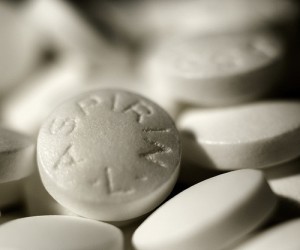Acetylsalicylic acid, commonly known as aspirin, has been noted not only for its dangerous side effects and long term damage to the body, but also various cardiovascular benefits. Although typically used for reducing pain and aching, aspirin may have a new place in the cancer world. U.S. studies and reports have flooded the internet, claiming that taking aspirin daily could significantly reduce the risk of death by cancer. But what does Aspirin really do?
 According to the results published in Journal of the National Cancer Institute, the mortality rate due to cancer among patients using aspirin each day is 8% lower than those not-using the drug. Research points the to the notion that aspirin may be a cancer-preventive treatment. However inspiring this breakthrough may be, aspirin use still has doctors and patients wondering if this endless intake of aspirin is safe.
According to the results published in Journal of the National Cancer Institute, the mortality rate due to cancer among patients using aspirin each day is 8% lower than those not-using the drug. Research points the to the notion that aspirin may be a cancer-preventive treatment. However inspiring this breakthrough may be, aspirin use still has doctors and patients wondering if this endless intake of aspirin is safe.
Utilizing aspirin has been shown to provide many benefits for patients across the board. From reducing the risk of a heart attack to relieving aches and swelling from arthritis, aspirin is used as a remedy for just about anything. It’s no wonder that 80 billion tablets of aspirin are taken each year. This magic pill may seem too good to be true, and frankly, that’s because it is!
As with other non-steroidal anti-inflammatory drugs (NSAIDs), when taken for an extended period of time aspirin increases the risk of serious gastrointestinal bleeding. Approximately 15% of these patients continually using NSAIDs develop peptic ulcers. For treating minor aches and pains, it may not be worth the risk to keep taking this medicine. However, when comparing the possibility of stomach bleeding to the risk of death by cancer, this decision could require some serious thought.
Doctors explain that due to the recency of this finding, aspirin should not be recommended as a cancer prevention method quite yet. The adverse side effects of aspirin can be undeniably dangerous, so before starting a regimen of over-the-counter aspirin products to reduce the threat of cancer, be forewarned that taking too much aspirin could cause a hole in your stomach. Patients should not begin long-term treatment without consulting their doctor about safely using aspirin.
For the latest updates on medicine breakthroughs and news continue checking Bad Drug to keep you healthy and out of harms way.
0."/>